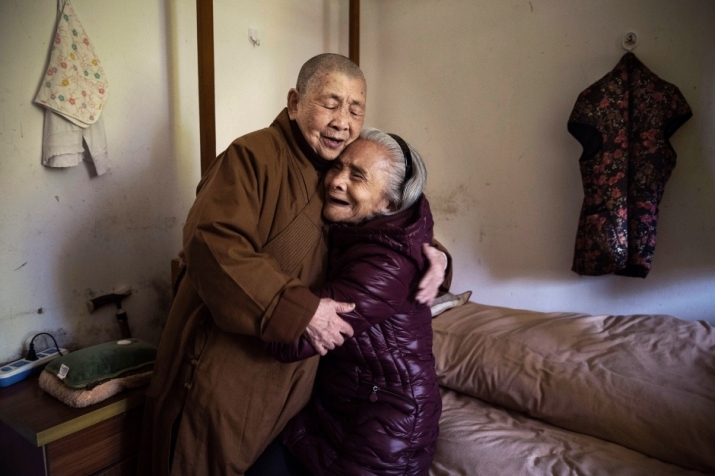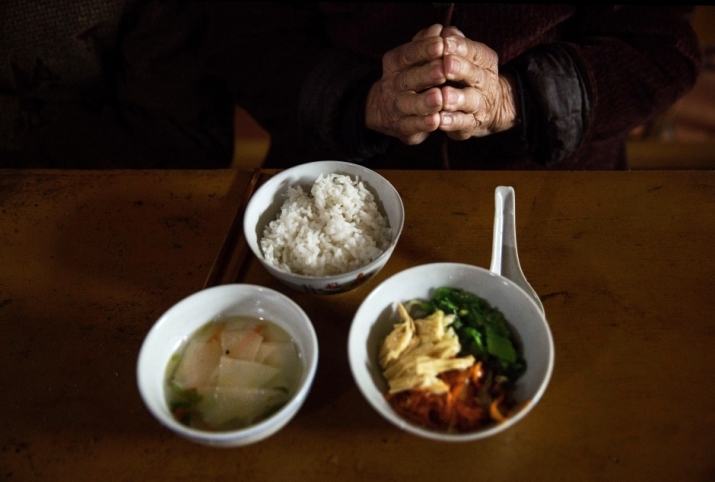NEWS
Buddhist Temple in China Provides Sanctuary and Dignity for the Elderly
 Buddhist nun Nen Qing, 81, hugs resident Luo Yudi, also 81, who has suffered a stroke. Photo by Kevin Frayer. From cbc.ca
Buddhist nun Nen Qing, 81, hugs resident Luo Yudi, also 81, who has suffered a stroke. Photo by Kevin Frayer. From cbc.caWith a declining labor force and a rapidly aging population putting increasing pressure on traditional ways of life and societal ties, China’s senior citizens face many uncertainties. But while state provisions for the aged in China are scant and a growing number of elderly parents cannot rely on their children to care for them, Ji Xiang, a Buddhist temple in the southeastern province of Fujian, offers a glimmer of hope for those entering their twilight years.
China has the fastest ageing population in human history, according to the World Bank. Data from China’s National Bureau of Statistics indicates that the country’s working-age population reached 911 million in 2015, compared with almost 222 million senior citizens. By 2020, the number of people aged 16–59 is projected to decline to 824 million, taking the working-age population down from 66.3 per cent last year to 56.9 per cent. This severe imbalance in China’s demographic structure, influenced by an ageing society, low fertility rates, and a gender imbalance, bodes ill for the future.
Recognizing a growing need that is not being met elsewhere, Ji Xiang, nestled among Fujian’s verdant mountains, has become the final home of dozens of senior citizens with nowhere else to turn. Some of its elderly lay residents are too poor to live anywhere else, while others have no offspring to care for them, but most have come here from extremely poor communities where, no longer able to work, they are viewed as a burden by their families and left to fend for themselves.
“In this area, there’s not much family loyalty. Old people are really suffering,” said Nen Qing, 81, the temple’s head nun. “In a neighboring village, there was one old person who had eight children. Every morning, he went to each of the children's families but no one even invited him in for breakfast. The village contacted us, but it was too late. He had already committed suicide.” (BBC)
Despite her own advanced years, Neng Qing, heads the operation to care the temple’s elderly residents and travels into villages to rescue elderly people who are dying from a lack of care. “It’s heartbreaking when we go to pick up these people from their homes because some of them have been sick for a long time,” she said. “Sometimes, daughters-in-law make their husbands abandon their mothers because they’ve lost the ability to work. They’re in such bad health that we have to carry them out on a stretcher, but then we nurse them back to health.” (BBC)
 The temple offers its elderly residents a sense of community and dignity during their final years based on a daily schedule structured around Buddhist traditions and values. Photo by Kevin Frayer. From cbc.ca
The temple offers its elderly residents a sense of community and dignity during their final years based on a daily schedule structured around Buddhist traditions and values. Photo by Kevin Frayer. From cbc.caJi Xiang is one of the few places in China offering free end-of-life care and the residents are well aware of their good fortune and clearly appreciative of the difference the temple’s work has made in their lives—some comfort, a sense of community, and a measure of dignity in their final years.
“Life here at the temple is very organized,” said Shi Guazi, 86, who shares a room with her sister Shi Yuping, 92. “We start reading Buddhist books before dawn, then we eat breakfast. From 8–9 a.m. we do more chanting and in the afternoon we study Buddhism for a few more hours. We love the rituals and our daily routines. (Dailymotion)
When Shi Guazi first arrived at the temple, she was painfully thin because her children had refused to feed her more than a bowl of rice a day. “I have four sons but no one wanted to look after me,” she lamented. “I came here alone 10 years ago. Later my sister joined me, now we live together and care for each other.” (Dailymotion)
See more
Who will take care of China's elderly people? (BBC)
Inside the Ji Xiang temple, China's elderly orphanage (Dailymotion)
A rural temple in China houses the elderly for free (CBC News)
China Faces Challenges of Declining Labor Force & Aging Population (China Topix)














